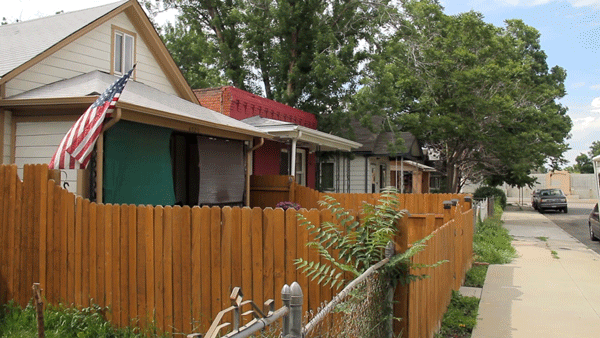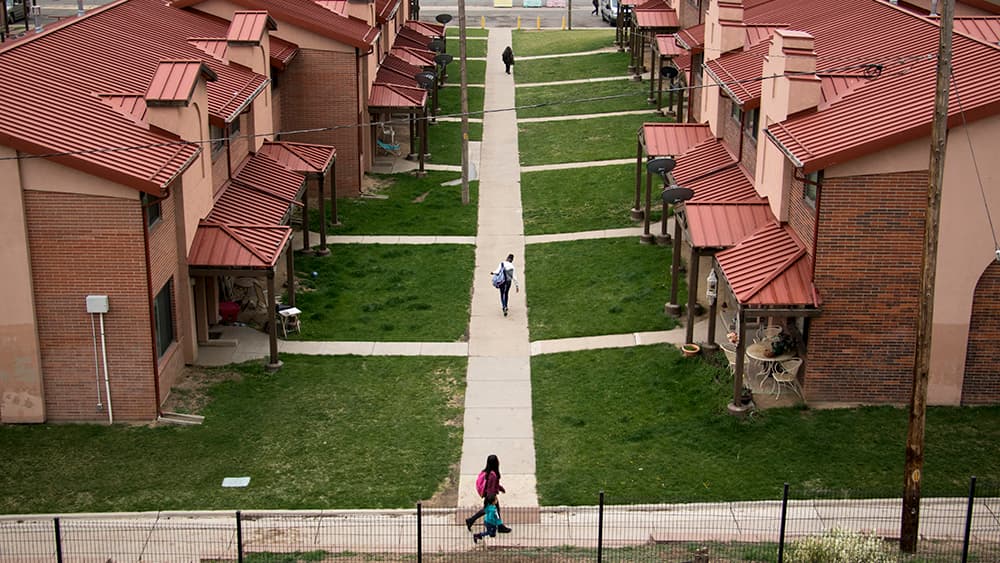The key to preserving the character of some of Denver’s neighborhoods is already in the city's hands.
At least that's what the city's hoping as it creates a task force developed by the city's Office of Economic Development that will carry out one of Mayor Michael Hancock's central goals for his proposed budget plan.
It’s called the Neighborhood Equity and Stabilizing Team, or NEST, and it sounds a bit like a city-led anti-gentrification task force, since its primary goal is to ensure vulnerable neighborhoods are able to continue growing without displacement for current residents.
NEST was introduced by Hancock during his 2018 state of the city speech, and mentioned again in his 2019 budget announcement. Hancock cited the team as an example of his administration’s overarching goal to preserve and protect characteristics in the city’s neighborhoods.
NEST will focus on Globeville, Elyria-Swansea, Montbello, Northeast Park Hill, Sun Valley and Westwood.
Denver’s chief economist Jeff Romine, who’s currently overseeing the task force’s roll out, said the city’s the city is in the process of hiring an executive director to oversee the task force, which will involve existing staff bringing together programs the city has made available for several years.
The existing programs include Bank on Denver, which provides financial services for low-to-moderate income people and was started under then-Mayor John Hickenlooper, as well renter’s relief and homeownership counseling.
Romine said Denver's gentrification study helped the city figure out how they approached neighborhoods at risk for displacement.
“Just because a neighborhood is changing doesn’t mean it’s all bad, but what we want to do is think about and try to improve the equity outcomes of that change so that everybody can benefit from that change,” he said.

“What we quickly began to realize through a series of conversations that started about six months ago, is that we weren’t connecting that well,” Romine said. “As oftentimes happens within government, everybody does their thing."
The task force will include staff from OED, Denver Human Services, Denver Human Rights and Community Partnerships, Environmental Health and Community Planning and Development. Romine said there will also be a collaboration with nonprofit groups, though he added it will be up to the director to establish formal partnerships.
Among the partners is Mile High United Way. Their spokesperson Shelby Ross said in a statement they are, "thrilled to be part of the task force that advances equity across neighborhoods in the Metro Denver area."
"This work greatly aligns with Mile High United Way’s commitment to transforming communities by creating positive change for our residents," Ross said. "We are glad Eddie Koen, our chief impact officer, will be part of this important work."
We know a little bit about what the team will actually do (and not do).
The city wants NEST to be their “holistic” approach toward gentrification and stabilization, Romine said.
Translation: Fewer meetings, more neighborhood action.
“It’s not 20 people coming together and being formed into a new thing,” Romine said about NEST. He added: “This is about delivering programs and services now, not in two years.”
A primary goal is helping residents avoid neighborhood displacement.
“The reality is Denver is also a changing place,” Romine said. “We want to reflect and know that that change is coming, but at the same time, stand with what made us unique and authentic.”
“So it’s respecting that tradition and respecting that past while building a new future together,” Romine added.
Romine said NEST will try to lure more money for housing development, including preservation of existing units and creation of new housing. It will include helping people get homeownership and increasing an existing revolving-loan fund for small businesses.
For residents living in Councilwoman Stacie Gilmore's district, which includes Montbello, this especially important. She said affordable housing and financial empowerment, two areas NEST will try to address, are top priorities for residents in Montbello.
Gilmore said she's hoping NEST will provide assistance to residents, businesses and nonprofits who want to stay in the neighborhood.
"What we're finding specifically in the Montbello community and parts of Green Valley Ranch are folks need support services," Gilmore said. "We need to support our residents but also small business and nonprofit."
Councilman Paul López, who represents the changing Sun Valley neighborhood, said it's important for the city to have "a real, meaningful interface" with people struggling to stay in the city. He said the concept behind NEST is "long overdue" and needs to include business opportunities.
"Anytime we're talking about gentrification, in a lot of ways, we're already trying to play catch-up," López said. "However, we have to make sure that they're not just conversations. We have to make sure that when we are planning neighborhoods when we're creating affordable housing in any given part of the city that's in desperate need of it, that we are also creating a local economy with it."
One way NEST will try and help out neighborhoods and their residents is by linking more residents up with existing programs. This meshes with Hancock's plan to fund two new neighborhood resource centers in Globeville and Montebello.
The list includes federally-funded programs like SNAP benefits. Romine said he estimates that 50 percent of people who qualify aren't actually receiving these benefits. These are dollars “being lost” Romine said.
“So Denver Human Services is striving to get more people qualified, more people enrolled into that program,” Romine said. “Sometimes people don’t enroll for their own personal reasons.”

Romine said the task force will link more people up with the Temporary Rental and Utility Assistance program, which is a program he said ran out of money "rapidly" before the city added an additional $1 million to provide more resources.
There will also be a push to provide more notice to local nonprofits about available grant money made available through OED.
He added that while it’s “kind of boring,” they will be using data to create an impact investment tool, which he said will help predict how things are changing in certain neighborhoods and to what degree.
“We want to turn those factoids, those pieces of data which tells us a little bit about the community today and yesterday, and turn it into what it’s going to mean tomorrow,” Romine said.
Romine said the new director should be announced within the next few weeks.
The position will be housed at OED; their spokesperson Derek Woodbury said the position has a salary range of $87,200-$139,500, though he added over email, "city typically doesn’t provide a starting salary higher than the mid-point of the range."
The recruitment for the director has included a nationwide search; Romine said they received applicants from New York to L.A.
“We’re very focused on having somebody that ... within our selection process, as we’ve been moving through, we want somebody that actually understands and has walked the walk if you will,” Romine said.

They’re seeking someone who’s familiar with changing neighborhoods. It could be someone from outside the city, but they would need to have worked in an urban area.
“We are not under any illusion that the City and County of Denver, or any of us, have all the answers,” Romine said. “We are under the illusion that we believe that this community is incredibly innovative and together we have a lot of answers.”














